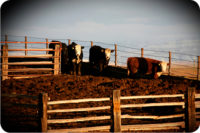Farm to Plate
Choose wisely when hiring animal handlers
Hire the right type of people for animal-handling jobs — and the right managers to lead them.

It is no secret that different people may react in vastly different ways to stressful situations. The basic tendencies of people who are working in stressful conditions are relatively universal across industries. In psychology, some researchers1 have identified the perceived level of control that an individual has over their environment as a major factor in how they react to stress and frustration in the workplace.
People who believe they have a higher level of control of their environment tend to handle adversity in a more engaged manner by making efforts to fix the problem. People who believe they have no control over their environment tend to become more frustrated and take that frustration out on their coworkers.
Other factors play into how someone responds to a stressful event in the workplace. One strong influence comes from the coworkers of an individual in a stressful situation.
If the culture in the workplace has developed to allow aggressive outbursts as the common way of dealing with adversity, it is more likely that an individual in a stressful situation will resort to that type of behavior. Fortunately, the opposite is also true — if the culture of the workplace doesn’t accept aggressive outbursts to occur in the face of adversity, an individual is less likely to engage in aggressive responses to adversity.
The level of stress and the ability of an individual to cope with stress in the workplace matters to the meat industry.
It is not uncommon for the person that does not believe they have the ability to change their environment to resort to deviant behavior, such as dissociative aggression, to vent their frustration. Dissociative aggression occurs when the frustration that was caused by one person is directed at an innocent bystander.
Since we work in close proximity to people and animals, the innocent bystander could be either.
In some cases, the cause of the stressful work environment could be caused by abusive management practices. It is very important to note that abusive management is defined as “employees’ perceptions of the supervisor’s intentionally harmful behavior against them.”
In general, a single outburst by a supervisor on a bad day is not going to be classified as abusive management, but consistent berating and intimidation of employees is. Research has indicated that the individuals with a high level of perceived control over their environment are more likely to report an abusive manager to their human-resources department. The individuals with less perceived control are more likely to engage in dissociative aggression and other deviant behavior in retaliation if they think they have been wronged.
This is where things can get dangerous.
As we select the correct people to work our animal-handling and stunning facilities, we must be aware of the importance of choosing people that can handle adversity and find constructive ways to solve problems. Managers who oversee these problem solvers must be firm and fair leaders, but not abusive to their employees or the animals.
Choosing the wrong people to handle animals and managing them in a disrespectful and abusive manner could be the first steps down a very slippery slope.
1Mitchell, M. S. and M. L. Ambrose. 2012. Employees’ behavioral reactions to supervisor aggression: An examination of individual and situational factors. J. Appl. Psych. 97:1148 – 1170.
Looking for a reprint of this article?
From high-res PDFs to custom plaques, order your copy today!







